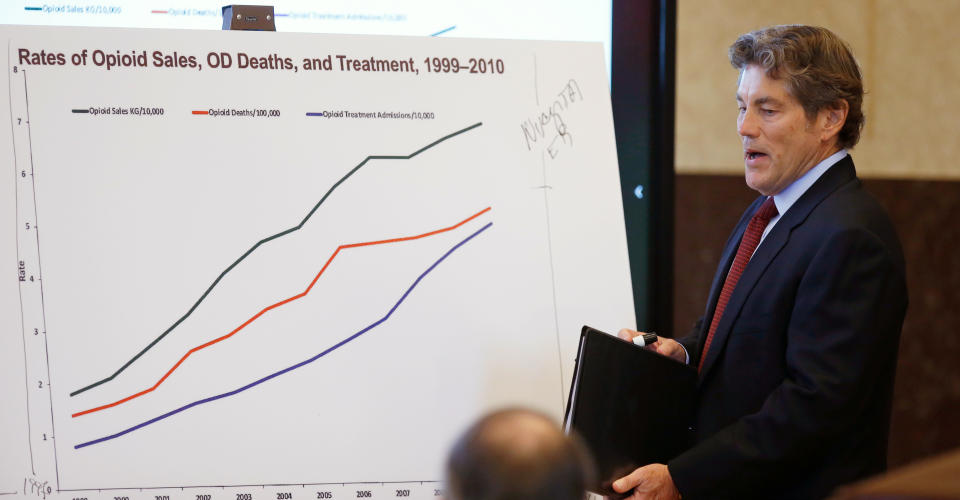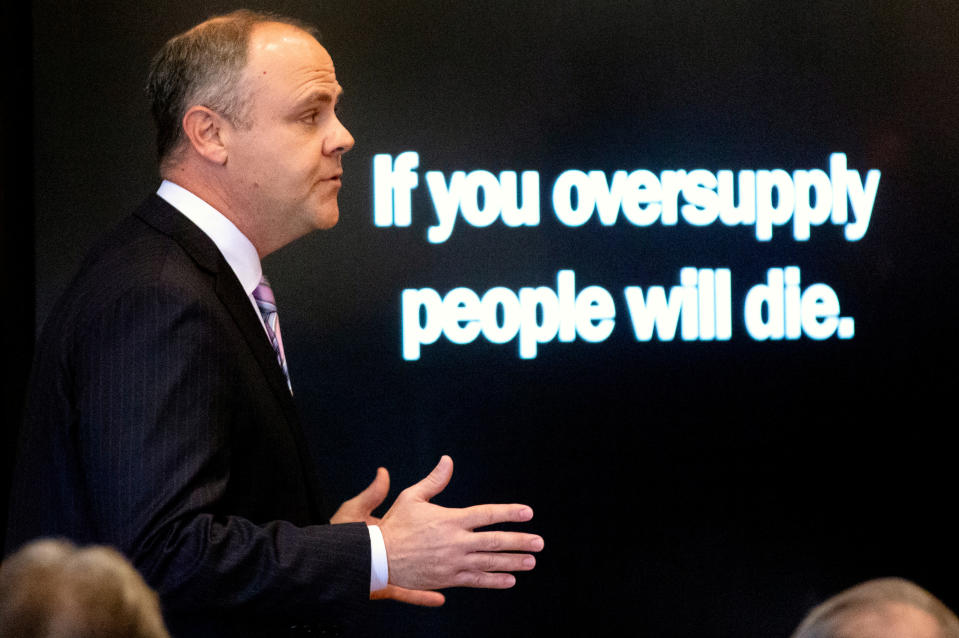Lawyer: The landmark J&J opioid ruling 'sends a message'
On Monday, a judge ruled that Johnson & Johnson (JNJ) breached Oklahoma’s public nuisance law and ordered it to pay $572 million for its role in the state’s opioid crisis. This ruling was the first of its kind.
Harry Nelson, managing partner at Nelson Hardiman law firm and author of “The United States of Opioids: A Prescription for Liberating a Nation in Pain,” described the ruling as “a significant win” for the state of Oklahoma.
“It sends a message, more importantly, that the public nuisance theory — which doesn’t require any proof of fraud — is actually viable,” Nelson said on Yahoo Finance’s YFi AM. “So I think this is broadly good news for the plaintiffs, bad news for pharmaceuticals, even though it’s not nearly as bad as it could have been.”

‘How much is enough?’
J&J was facing a potential $17 billion judgment in its case, which accused J&J and other pharmaceutical companies of downplaying the dangerous effects of the opioids they marketed.
Back in March 2019, Oklahoma reached a $270 million settlement with Purdue Pharma after alleging the pharmaceutical company used aggressive marketing tactics and deceptive claims with its drug, Oxycontin. Just two months later, Teva Pharmaceuticals paid the state $85 million to settle opioid claims.
J&J — which makes an array of consumer products — was in an unusual position because it supplied opiate ingredients for other drugmakers and made its own own opioids through its Janssen Pharmaceuticals subsidiary.
While J&J ultimately lost at trial, the $572 million fine represents a tiny amount for a company that had over $81 billion in sales last year.
“It’s true, it’s only a drop in the bucket of $17 billion they were going after,” he said. “But it’s double what they settled for Purdue. It’s six times what they got from Teva Pharmaceuticals.”

“It’s a tricky thing,” Nelson said. “We have so many of these cases going on. How much is enough? The state of Oklahoma is thrilled to have a billion dollars collectively now from Teva, Purdue, and Johnson and Johnson. But the question is going to be over and over again: how much is it going to cost to clean up this mess?”
The original $17 billion that Oklahoma sought from J&J was to pay for drug courts, addiction treatment, and other services for people affected by opioid misuse, The New York Times reported.
“One of the lessons of this decision is that the harm is so profound from opioids — not just the overdose deaths, but the addiction that needs to be treated, all of the cost imposed on hospitals, law enforcement, first responders,” Nelson said. “It still means that people are going to look to Johnson and Johnson, as to the other opiate manufacturers, to pay for the harm that was caused by this product.”
In his ruling, the judge found that J&J used “false, misleading, and dangerous marketing campaigns [that] have caused exponentially increasing rates of addiction, overdose deaths, and Neonatal Abstinence Syndrome.”

Why did J&J risk losing at trial when the other pharma companies settled?
“I think Johnson and Johnson has a history of being more willing to press and not settle cases,” Nelson said. “They have a brand and an image in the market. They have so many products that they’re known for that I think Johnson and Johnson was willing to gamble that they wouldn’t be viewed as a responsible party.”
After Monday’s ruling, J&J said that it planned to appeal. In a statement to Yahoo Finance, the company said, “The company must responsibly address its litigations, including being willing to go to trial when the facts and law are so strongly on our side.”
“I don’t think this crisis is going anywhere,” Nelson said. “The overall numbers of drug overdose deaths keep going up, up, and up. This is going to be front and center for a long time.”
Adriana is an associate editor for Yahoo Finance. Follow her on Twitter @adrianambells.
READ MORE:
Johnson & Johnson CFO on the opioid crisis: 'We don’t believe we were the cause'
Former DEA agent on fentanyl: ‘By far, the worst drug I’ve ever seen'
Read the latest financial and business news from Yahoo Finance
Follow Yahoo Finance on Twitter, Facebook, Instagram, Flipboard, SmartNews, LinkedIn, YouTube, and reddit.


